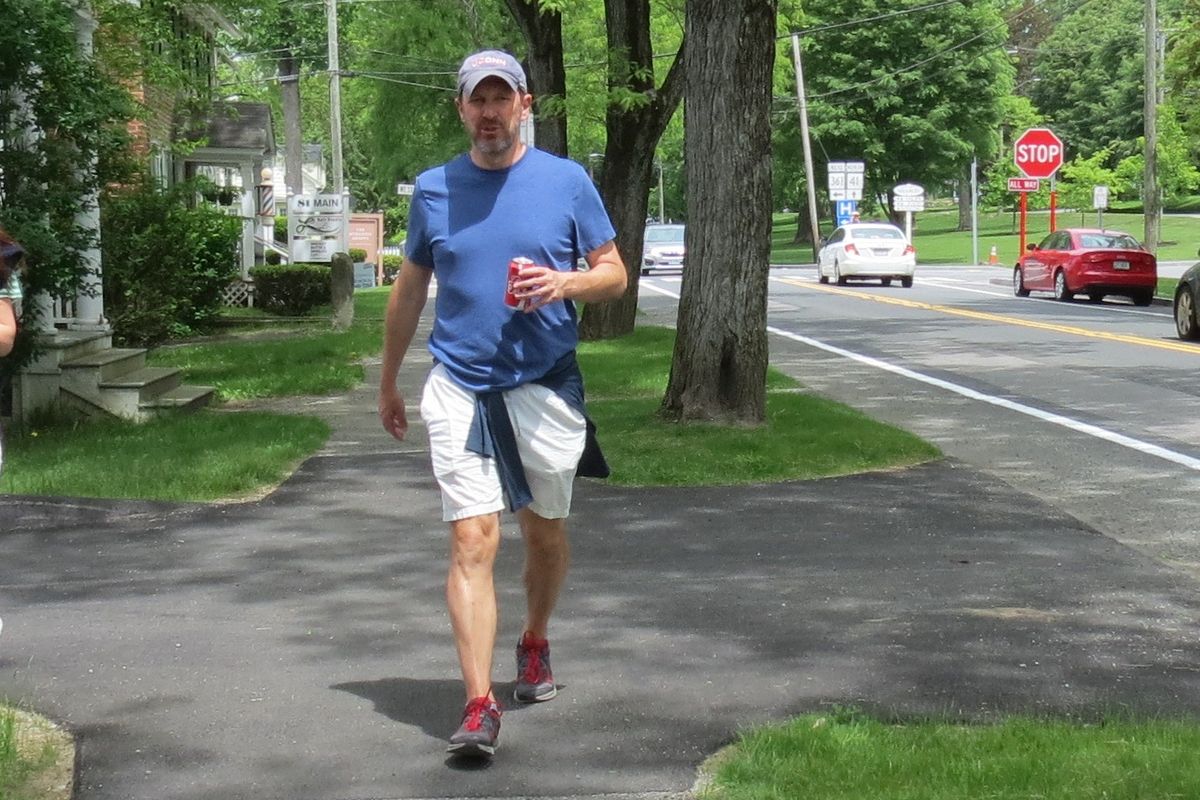Latest News
U.S. Sen. Chris Murphy walks through Sharon on the first day of his annual statewide walk.
Photo by Ruth Epstein
Decked out in a blue T-shirt, khaki shorts and a UConn cap, the man walking along Route 41 in Sharon Wednesday morning looked like others who just enjoy getting out to commune with nature. But U. S. Sen. Chris Murphy (D) had some other thoughts on his mind.
For the ninth year, he was walking across Connecticut to connect with citizens of the state. This year’s route began May 28 in Salisbury and took him to Sharon and Kent for the day.
People along the way wanted to chat with the lawmaker, and despite some gentle prodding from his staffers to keep on pace, Murphy took time to converse with those he met covering a variety of topics. On Route 41 between Lakeville and Salisbury, he encountered longtime friend, former State Rep. Roberta Willis, of Salisbury, who along with her sister Sherie Berk, greeted him with a sign stating “Chris, We’re proud of U.”
Continuing his walk, he made a stop at Sharon Center School where he spoke with sixth- and seventh-graders. Then he met with some of the younger children, who, he said, “had a million ideas about what they could do for our country.”

Following a stop at Standard Space art gallery, he proceeded to Town Hall, where First Selectman Casey Flanagan presented him with a tiny step counter. Pleased with the gift, he said he had been wanting to get one but never got around to it.
At Town Hall, the subject of Mudge Pond came up, with the selectmen telling him how important that natural resource is to the town. Selectman Lynn Kearcher said so far, its condition is not too bad, but the threat of an invasion of hydrilla is a constant worry. “Lynn and I both grew up on that lake. We want to save it for generations to come,” said Flanagan.
Kearcher asked what the citizens of Sharon can do to combat the current administration in Washington. Murphy recommended joining activist groups and getting involved. “All that can make a difference.”
He acknowledged the latest big bill proposed by the Republicans which was approved by the House of Representatives is bad for Connecticut. One of its features calls for reducing Medicaid payments in blue states by 10 percent. It will throw millions around the country off the plan, he said. The bill will also result in adding $3.5 trillion to the national debt.
“It’s an ugly bill,” said Murphy.
As he headed off to Kent, he was met by some Sharon Playhouse employees who excitedly told him about this year’s productions. The walk to Kent proved to be a strenuous one, with a long steep mountain to climb. Once in the center of Kent, he crossed over the Housatonic River on the bridge next to Kent School.

Murphy explained the purpose of the walk, which over the nine years has touched all areas of the state. “My job is to listen. I can’t do my job well unless I listen to what people are saying.”
On this trip, he found the issues of housing and Medicaid were what people were talking about. The push and pull between conserving land and the need for housing was also on people’s minds.
In Kent, he made a stop at Motoriot, where owner Jason Doornick explained he refurbishes vintage 4 x 4s. Murphy was impressed with what he saw. He also visited Kent Wine & Spirits and the Mobil station and convenience store where customer Tom Connors approached him and asked, “When did bravery go out of fashion?”
Murphy planned to walk another four days with the aim of reaching Long Island Sound.
Keep ReadingShow less
Marion J. Pedersen
May 28, 2025
SHARON — Marion J. (Cookingham) Pedersen of Sharon, passed peacefully on May 20, 2025, at the age of 91.
Born in Pine Plains, New York, she lived a life of love and unwavering strength. She was a devoted mother, grandmother, great-grandmother and wife known for her cooking skills.
Her greatest joy was taking care of and feeding her family. For over 50 years she knew most of the children in Sharon, either by driving them to and from school on the bus or by feeding them lunch in the Sharon Center School cafeteria. She will be missed by so many.
She is survived and missed by her husband of 74 years, Niels (Pete) Pedersen, her two sons Niels (Peter) Pedersen Jr., and wife Lori of Sharon, Dennis Pedersen and wife Bonnie of Winchester, and her daughter, Deborah Pedersen of Winsted. She will forever be cherished and remembered by her granddaughters, Hollie Boyuk and husband Michael, Sarah White and husband Michael, five great-grandsons, Dylan and wife Ashley, Brandon, Caleb, Christopher and Jacob, and numerous other family members who will miss her dearly.
Marion was the youngest of 12 children and predeceased by her 11 siblings.
All services are private.Memorial contributions may be made to the donors choice. Kenny Funeral Home has care of arrangements.
Keep ReadingShow less
Eleanor Sternlof
May 28, 2025
LIME ROCK — Eleanor Anne Sternlof (née de Guise) of White Hollow Road passed away on April 25, 2025 at Geer Village in North Canaan, Connecticut. She was 94 and the loving wife of the late Paul William Sternlof, who died on August 12, 2005.
Calling hours will be held on Saturday, May 31, from 11am to 1pm at The Kenny Funeral Home, 41 Main Street, Sharon, CT.
The Kenny Funeral Home has care of arrangements.
Keep ReadingShow less
Jacqueline Irene Dirck
May 28, 2025
SHARON — Jacqueline Irene Dirck, affectionately known as Jackie, passed away peacefully on May 20, 2025, in Phoenix, Arizona, at the age of 84. Born on Nov. 19, 1940, in Joplin, Missouri, Jackie lived a life filled with warmth, laughter, and deep devotion to those she loved.
Jackie shared an extraordinary 62-year marriage with her high school sweetheart and beloved husband, Ronald Dirck. Their enduring partnership was a shining example of lifelong love and unwavering support. Together they created a home that radiated joy, a gathering place for family celebrations marked by spirited card games, hearty meals, and heartfelt conversations. Jackie especially treasured quiet afternoons spent with a cocktail in hand, embracing life’s simple pleasures with grace and good cheer.
She was a devoted mother to Melissa Dirck Appel and her husband Jeff Appel, and Patrick Dirck and his wife Lisa Dirck. She carried the memory of her son Kevin with enduring love throughout her life. Her legacy continues through her cherished grandchildren; Alexandra, Caroline, Emma, Natalie, Evan, Cooper, Elle, and Tanner. Jackie is also fondly remembered by her sister, Charlene Barr and brother James Wilson.
A gifted cook with a generous spirit, Jackie found immense joy in bringing people together around the table. Her kitchen was always filled with the comforting aromas of treasured family recipes or exciting new culinary creations-each dish prepared with love and care. These shared meals became cherished traditions that strengthened bonds across generations.
Jackie also had a tender heart for animals. The loyal companionship of her beloved dogs brought her comfort and joy over the years-offering moments of peace amid life’s busy rhythm.
She was preceded in death by her parents, William and Maxine Wilson. Their guidance remained close to Jackie’s heart throughout her journey. In honor of Jackie’s compassionate nature and giving spirit, the family asks that in lieu of flowers, donations be made to The Susan G. Komen Foundation or The American Cancer Society.
Her light lives on in the hearts of all who knew her. May her memory continue to bring comfort and smiles to those she touched.
A private celebration of life for family and friends will be held at a later date.
Keep ReadingShow less
loading








